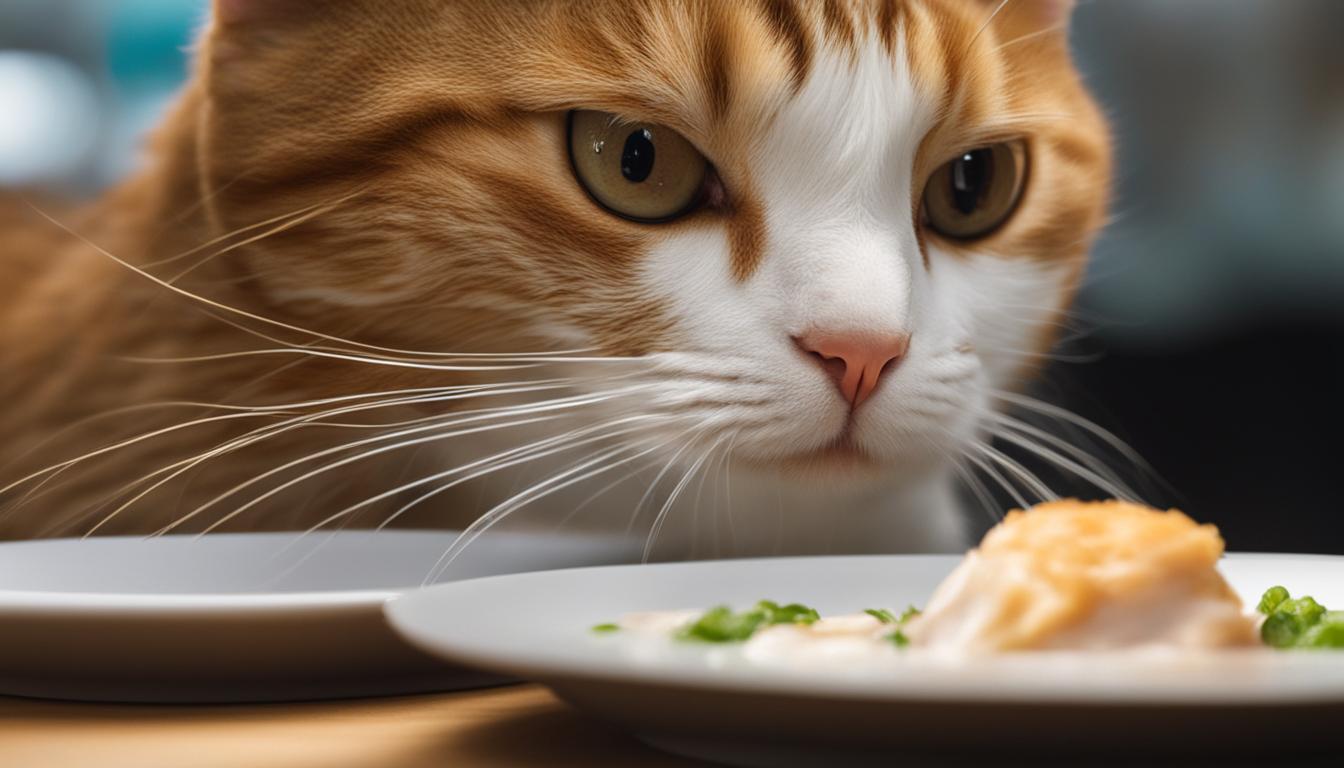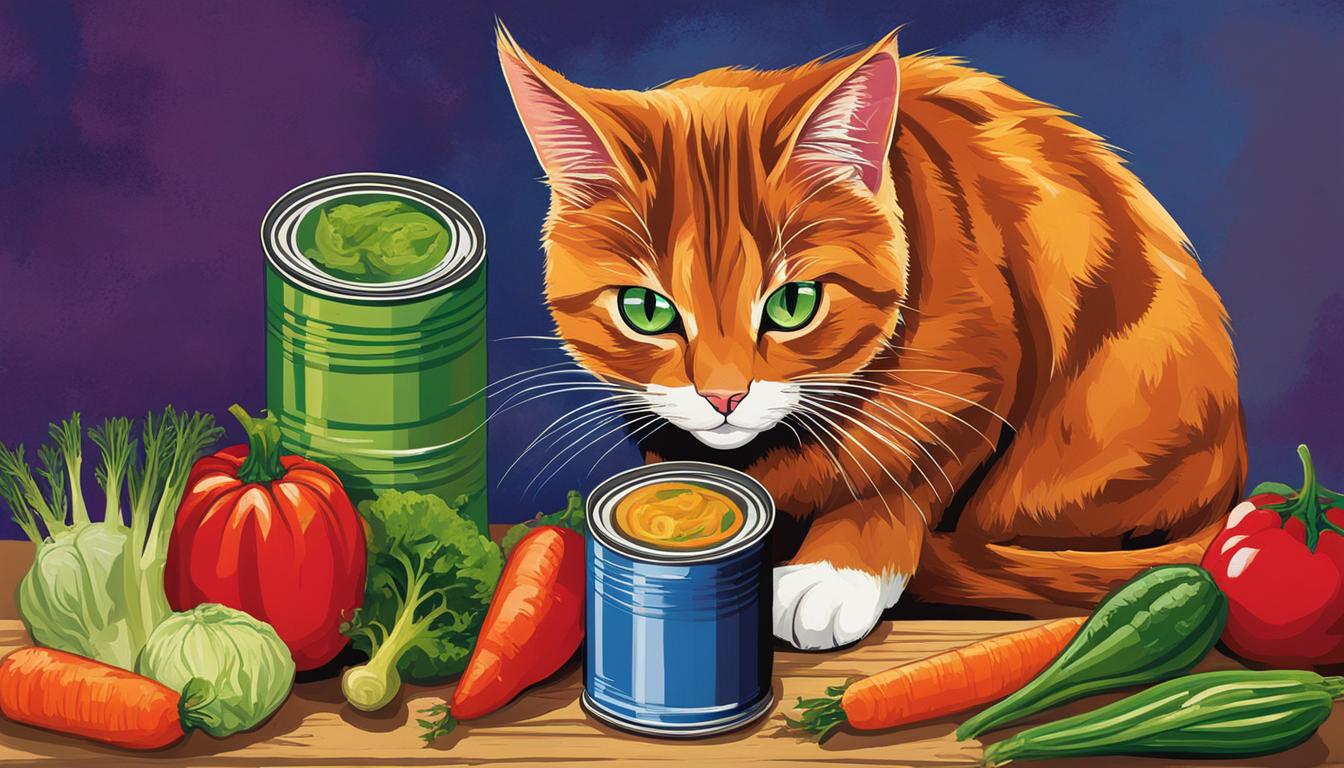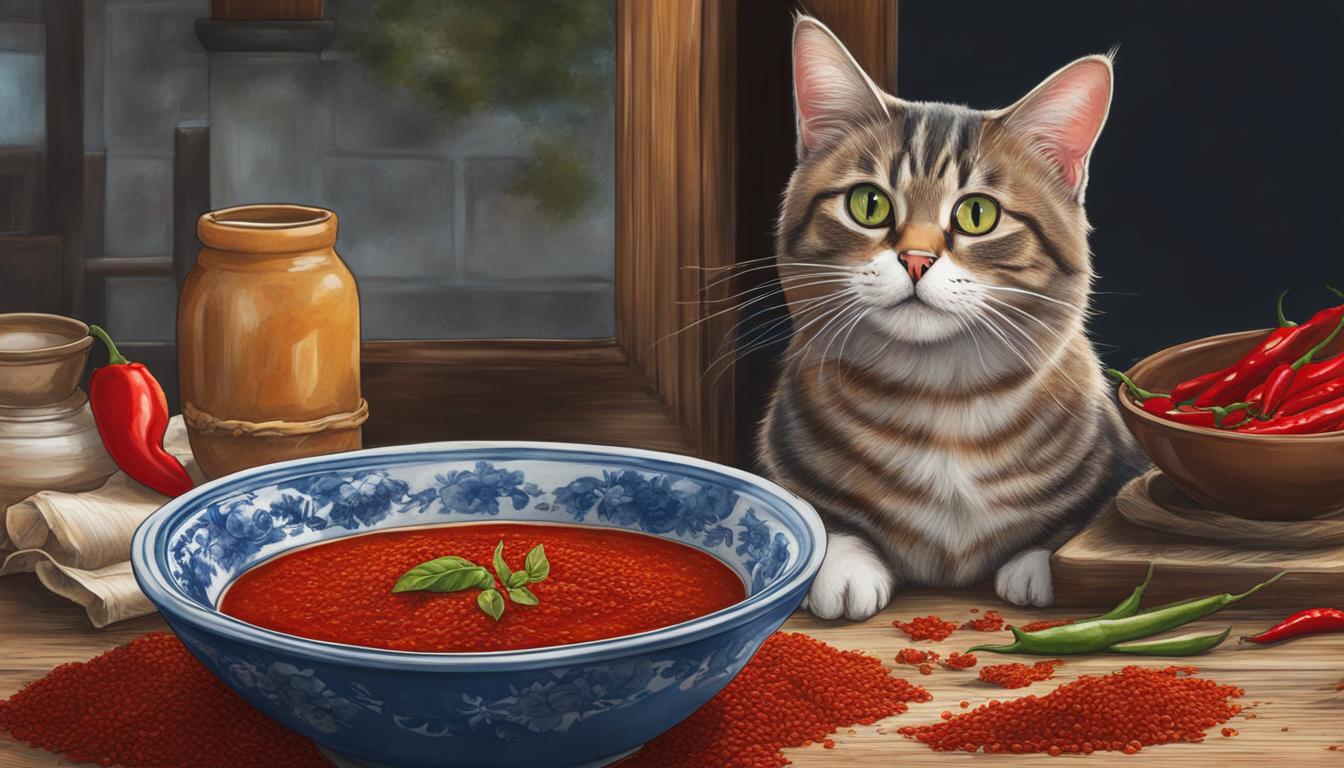As a cat owner, I’ve always wondered if cats can eat raw meat. After all, their wild relatives hunt and devour raw prey. But is it safe for our domesticated feline friends? Let’s dig into the benefits and risks of feeding cats raw meat, particularly raw poultry, and explore what experts have to say.
Key Takeaways:
- Feeding cats raw meat is a controversial topic with potential benefits and risks.
- Raw meat provides essential nutrients but may also contain parasites and bacteria.
- Consulting with a veterinarian is crucial before making any dietary changes.
- Proper handling and preparation of raw meat are essential to minimize health risks.
- Consider the nutritional balance and specific needs of your cat when planning a raw diet.
Benefits of Raw Meat for Cats
Feeding cats a raw diet has gained popularity among some pet owners, who believe it provides several benefits for feline health and well-being. Raw meat, such as chicken, offers essential nutrients that are important for a cat’s overall health. The natural diet of cats in the wild includes raw prey, so proponents of raw diets argue that feeding raw meat is more aligned with a cat’s evolutionary needs.
One of the main benefits of feeding raw meat to cats is the presence of fatty acids and taurine. These nutrients are vital for maintaining a cat’s healthy skin, coat, and overall organ function. Additionally, raw meat contains natural enzymes that can aid digestion and promote a healthy gastrointestinal system. Some pet owners also claim that a raw diet can help reduce allergies, increase energy levels, and minimize the risk of certain health issues.
“Feeding my cat a raw diet has transformed his overall health,” says Lisa, a dedicated raw feeder.
“Ever since I switched my cat to a raw diet, his coat is shinier, his energy levels have improved, and his digestion seems much better.”
While anecdotal evidence like this can be compelling, it is important to note that scientific research on the benefits of raw diets for cats is limited. Therefore, it is crucial to consult with a veterinarian to ensure that a raw diet is appropriate for your cat’s specific nutritional needs.
| Benefits of Raw Meat for Cats | |
|---|---|
| Provides essential nutrients like fatty acids and taurine | |
| Aids digestion and promotes a healthy gastrointestinal system | |
| May reduce allergies and increase energy levels | |
| Can help minimize the risk of certain health issues |

Risks of a Raw Diet for Cats
Feeding cats a raw diet can provide certain benefits, but it is important to be aware of the potential risks involved. Raw meat can contain parasites and bacteria that can cause foodborne illnesses in both cats and humans. While cats have a shorter digestive tract and higher stomach acidity, which makes them less susceptible to some pathogens, there is still a risk of infection.
Additionally, cats can develop allergies to certain proteins present in raw meat. These allergies can manifest as skin issues, digestive problems, or respiratory symptoms. It is important to monitor your cat closely and consult with a veterinarian if you notice any adverse reactions after feeding raw meat.
To minimize the risks associated with a raw diet, it is crucial to handle and prepare raw meat properly. This includes purchasing fresh, high-quality raw meat from reputable sources and keeping it refrigerated or frozen until use. When preparing the meat, use clean surfaces and utensils to prevent cross-contamination. It is also essential to remove any bones or potentially harmful parts before serving the meat to your cat.

Table: Common Risks of a Raw Diet for Cats
| Risk | Description |
|---|---|
| Foodborne Illnesses | Raw meat can contain parasites and bacteria that can cause infections in cats and humans. |
| Allergies | Cats can develop allergies to certain proteins present in raw meat, leading to skin issues, digestive problems, or respiratory symptoms. |
| Imbalanced Diet | There is a risk of nutritional imbalances if the raw diet is not properly balanced with all the necessary nutrients. |
While a raw diet can offer benefits, it is important to weigh the potential risks and consult with a veterinarian before making any dietary changes for your cat. They can provide guidance on whether a raw diet is suitable for your cat and help you create a balanced meal plan that meets their nutritional needs while minimizing the associated risks.
Preparing Raw Meat for Cats
When it comes to preparing raw meat for cats, it’s important to follow proper guidelines to ensure the safety and nutritional balance of their diet. Here are some essential steps to take:
- Choose high-quality, fresh raw meat from reputable sources. Look for meat that is specifically labeled for pet consumption.
- Keep the raw meat refrigerated or frozen until you are ready to use it. This helps to prevent the growth of bacteria.
- Use clean surfaces and utensils when handling and preparing raw meat to avoid cross-contamination. Wash your hands thoroughly before and after handling raw meat.
- Remove any bones from the raw meat before serving it to your cat. Some bones can pose a choking hazard or cause intestinal blockages.
- Consider consulting with a veterinarian or a veterinary nutritionist to ensure that your cat’s raw diet is balanced and provides all the necessary nutrients. They can help you create a customized meal plan based on your cat’s individual needs.
While there are homemade raw cat food recipes available online, it’s important to exercise caution and seek professional advice before implementing them. A balanced raw diet should include a variety of proteins, essential fatty acids, vitamins, and minerals to meet your cat’s nutritional requirements.
“Feeding raw meat to cats requires careful attention to detail. It’s crucial to choose the right ingredients, handle them properly, and ensure that the diet is nutritionally complete.” – Dr. Sarah Thompson, DVM
By following these guidelines and working closely with a veterinarian, you can provide your cat with a carefully prepared raw diet that meets their nutritional needs.
| Benefits of Preparing Raw Meat for Cats |
|---|
| 1. Mimics the natural diet of cats. |
| 2. Provides essential nutrients such as fatty acids and taurine. |
| 3. May improve digestion and promote a shiny coat and healthy skin. |
| 4. Can increase energy levels and reduce the risk of certain health issues. |
Remember, before making any changes to your cat’s diet, it’s important to consult with a veterinarian who can provide personalized advice based on your cat’s specific needs and health condition.
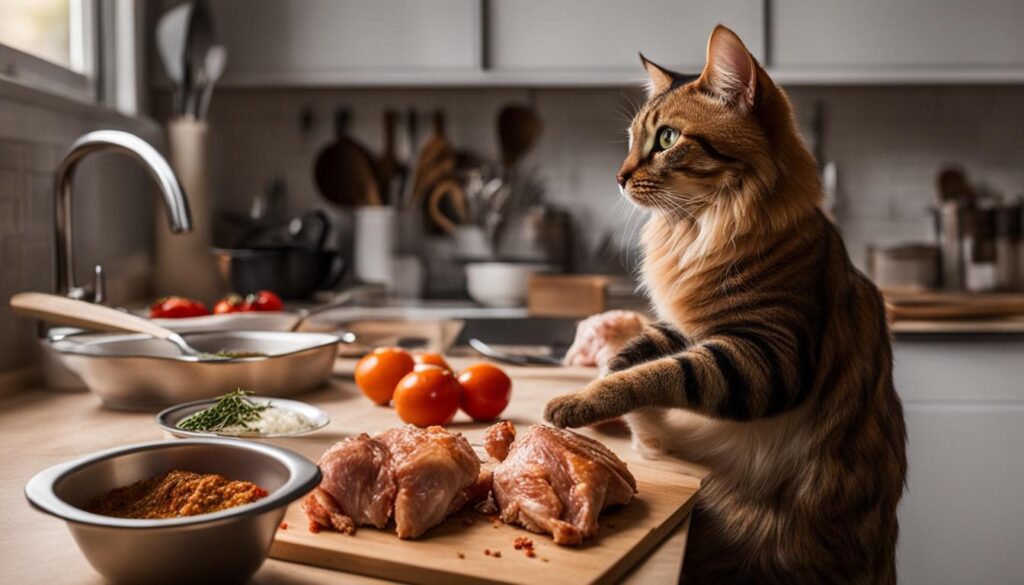
Considerations for Feeding Raw Meat to Cats
Feeding raw meat to cats requires careful consideration, particularly when it comes to specific groups such as kittens. While adult cats can tolerate raw meat to some extent, kittens have more sensitive stomachs and immune systems. Therefore, it is crucial to consult with a veterinarian before introducing raw meat into their diets to ensure their safety and wellbeing.
When considering the nutritional value of raw meat for felines, it is important to understand that while raw meat can provide certain essential nutrients, it may be deficient in other important vitamins and minerals. A balanced diet is crucial to ensure that your cat receives all the necessary nutrients for optimal health. Working with a veterinarian to create a balanced raw diet plan can help address any potential deficiencies and ensure your cat’s nutritional needs are met.
Consulting with a veterinarian is essential when it comes to feeding raw meat to cats, especially for kittens. They have different nutritional requirements and are more susceptible to potential risks associated with raw diets. It’s always better to seek professional guidance to ensure your cat’s health and wellbeing.
Regular check-ups with a veterinarian are also recommended to monitor your cat’s health when feeding them a raw diet. This allows your veterinarian to assess whether the diet is providing all the necessary nutrients and make any necessary adjustments. Remember, each cat is unique, and their dietary needs may vary, so it’s important to stay vigilant and responsive to any changes in their health or behavior.
| Diet Considerations for Raw Feeding | Benefits | Risks |
|---|---|---|
| Can Kittens Eat Raw Meat? | – Provides essential nutrients for growth – Mimics natural diet |
– Higher risk of bacterial contamination – May lack balanced nutrition |
| Nutritional Value of Raw Meat | – Contains essential fatty acids and taurine – Potential improvement in coat and skin health |
– May lack certain vitamins and minerals – Potential for nutritional imbalances |
| Balancing Raw Diets for Cats | – Potential for improved digestion – May reduce the risk of certain health issues |
– Potential for bacterial contamination – Allergies to certain proteins |
Feeding raw meat to cats is a decision that should be made based on thorough research, professional guidance, and careful consideration of your cat’s individual needs. While there are potential benefits to a raw diet, it is important to understand and address the risks involved to ensure the health and wellbeing of your feline companion.
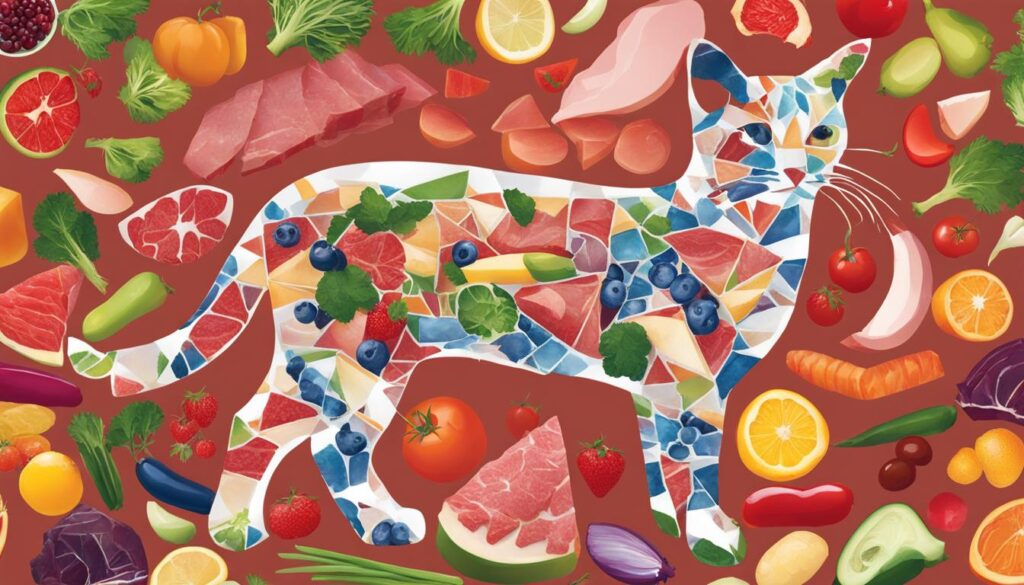
Conclusion
So, can cats eat raw meat? Well, the answer is not as simple as a yes or no. As we’ve explored in this article, feeding cats a raw diet comes with both benefits and risks that need to be carefully considered.
On one hand, a raw diet can provide certain nutrients and mimic a cat’s natural diet. It may improve digestion, promote a healthy coat, and boost energy levels. However, it’s important to note that these benefits are not scientifically proven and should be discussed with a veterinarian.
On the other hand, there are risks associated with a raw diet. Raw meat can contain harmful parasites and bacteria that can pose health risks to both cats and humans. Allergies to certain proteins in raw meat can also develop. Balancing the diet and ensuring it meets all the necessary nutritional needs of your cat is crucial.
In conclusion, the decision to feed your cat a raw diet should be made after consulting with a veterinarian and carefully weighing the pros and cons. Remember, proper handling and preparation of raw meat are essential to minimize the risk of contamination. Ultimately, it’s about finding the right balance for your furry friend’s health and well-being.
FAQ
Can cats eat raw meat?
Yes, cats can eat raw meat. However, it is important to be aware of the potential risks and consult with a veterinarian before making any dietary changes.
What are the benefits of feeding cats raw meat?
Supporters of raw diets claim that it can improve digestion, promote a shiny coat and healthy skin, increase energy levels, and reduce the risk of certain health issues. However, these claims are not scientifically proven and should be discussed with a veterinarian.
What are the risks of a raw diet for cats?
Raw meat can contain parasites and bacteria that can cause foodborne illnesses in cats and humans. Cats can also develop allergies to certain proteins present in raw meat. It is important to consult with a veterinarian to assess the risks.
How should I prepare raw meat for my cat?
When handling and preparing raw meat, ensure that you buy fresh, high-quality raw meat from reputable sources. Keep the meat refrigerated or frozen until ready to use. Use clean surfaces and utensils to prevent cross-contamination. Remove any bones or potentially harmful parts before serving.
Can kittens eat raw meat?
Before introducing raw meat into a kitten’s diet, it is important to consult with a veterinarian. Kittens have more sensitive stomachs and immune systems, so caution is necessary.
What is the nutritional value of raw meat for felines?
While raw meat can provide certain essential nutrients, it may be deficient in other important vitamins and minerals. Balancing the diet is crucial to ensure that your cat receives all the necessary nutrients.

